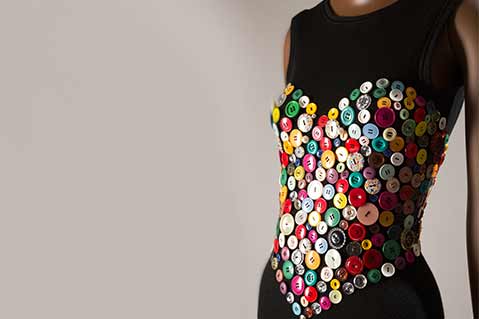Strategy February 03, 2017
FIT Exhibit Shows Off Work of Black Fashion Designers
Breathtaking and barrier-breaking fashion from more than 60 black fashion designers is front and center at the Museum at the Fashion Institute of Technology (FIT). It’s the first major exhibition in years to highlight the global history of black fashion designers from the 1950s to the present, according to the museum.
The exhibit, which closes May 16, is broken down into nine themes, including evening wear, menswear and activism. Among the iconic pieces on display is a red and white floral print dress by Laura Smalls, famously worn by former first lady Michelle Obama when she sang with rapper Missy Elliot on James Corden’s carpool karaoke. A glittering sheer mini-dress, liberally encrusted with Swarovski crystals was created by CD Greene in the 1990s for Tina Turner’s Wildest Dreams tour.

“Black Fashion Designers” is filled with edgy embellishments and unexpected flourishes. Nigerian designer Amaka Osakwe for Maki Oh embeds a woman’s face into a pale pink fringed dress, by varying the length and thickness of the fringe. A 1986 evening dress by Patrick Kelly features a plethora of mismatched vintage buttons sewn mosaic-style to create a heart-shaped bodice. Buttons were a recurring motif in Kelly’s designs, serving as an homage to his grandmother, who mended Kelly’s clothing and “to detract from having to use mismatched buttons on his shirts … started sewing them everywhere,” according to the exhibit. In the menswear section is a subversive white suit, embroidered with gold and crystals. It was created by Grace Wales Bonner, who blends European, African and Caribbean influences and uses her work to “challenge stereotypes of aggressive black masculinity.”
The section on activism includes several graphic T-shirts with political messages, including a shirt made of recycled plastic by Pharrell Williams’ G-Star Raw brand that advocates for environmental awareness. Another T, by Kerby Jean-Raymond serves as a powerful statement for the “Black Lives Matter” movement. An ensemble designed by Nkhensani Nkosi of Stoned Cherrie celebrates the history of the South African anti-apartheid movement with a T-shirt featuring the cover of Drum magazine, paired with a traditional Tsonga skirt.
